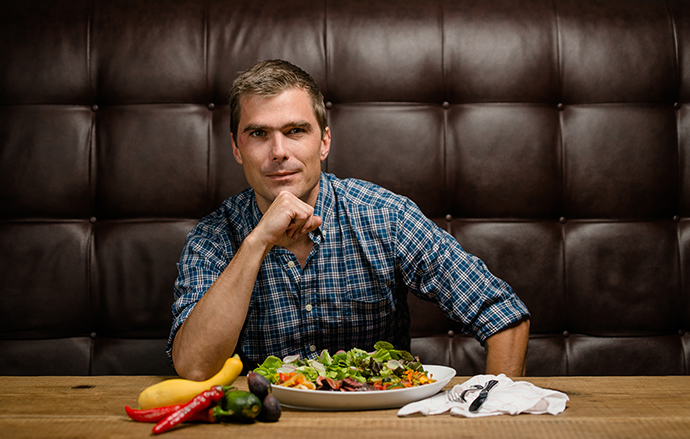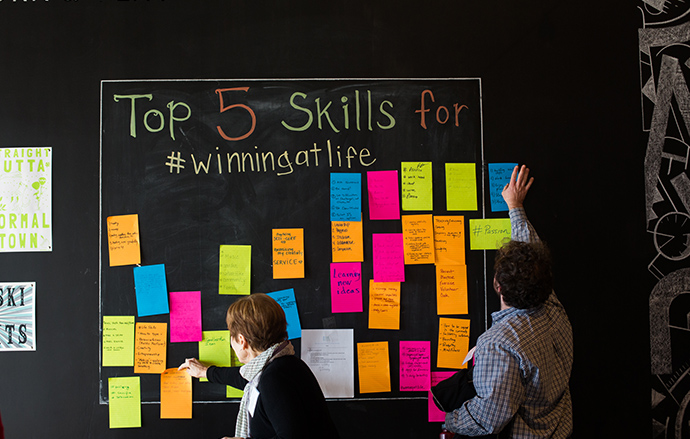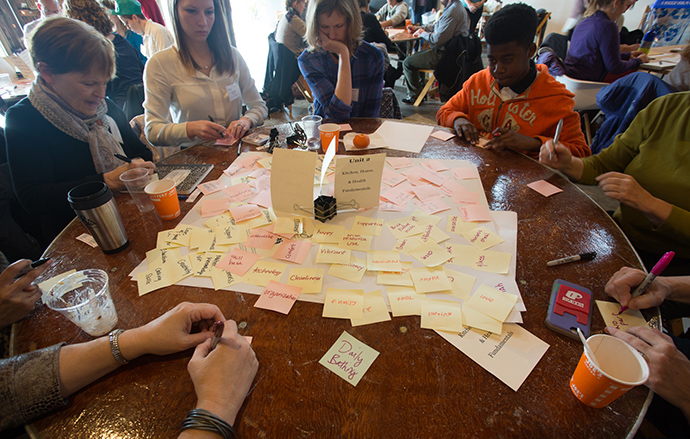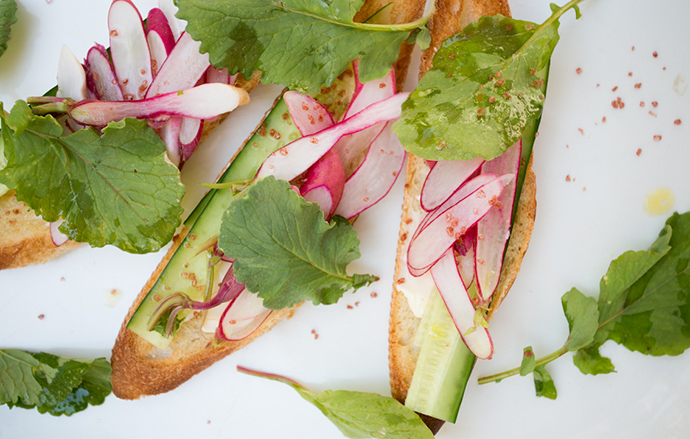JBF Award Winner Hugh Acheson’s Seed Life Skills: Home Ec for the Digital Age
Maggie Borden
Maggie BordenMarch 14, 2016

Despite a to-do list that includes overseeing his string of lauded Georgia restaurants, guest-judging on Top Chef, and writing best-selling cookbooks, JBF Award winner Hugh Acheson recently launched a nonprofit, Seed Life Skills, which aims to teach middle schoolers how home economics can prepare them for healthier and happier futures. We spoke with Acheson about his work-life balance, what the next generation of Americans really needs to know, and what home ec means in the information age.
--
JBF: Between your restaurants, cookbooks, and television appearances, you’re a pretty busy guy. How do you balance all of your responsibilities? What’s a typical day in the life of Hugh Acheson?
Hugh Acheson: I work from home and on planes, at restaurants, at coffee shops, in Delta lounges, and take calls in my car when I am on the road. Work in its present iteration for me is kind of an “always” affair. Most days I wake up and take the kids to school, work out, get to my office at home, write, test recipes, go to the restaurant to check on things, conduct interviews and whatnot, plan things, talk to Stan (the financials guy for my restaurants), plus all the chefs, and my assistant. I make lunch at home, plan dinner if I am able to be home, finish my work by 6:00, and make some vittles for the family. After dinner, the kids play around, I work a little, and then relax. It’s a pretty good life.
JBF: What inspired you to start your new project?
HA: Seed Life Skills was born out of my seeing a lack of concrete life skills in a lot of kids. I see kids of all shapes and sizes not knowing how to simply scramble an egg. They eat, sure, but my concern is for when they get to be 19 years old and have no options for fueling themselves because they just don’t have any cooking skills.
I also am completely enamored with my community, who has welcomed me and is the reason for my success, and feel that I should do everything I can to give back. I would do something like this if I were a dentist too, but my skills lie in cooking, so cooking it is.
JBF: Why middle school? What sets Seed Life Skills apart from some of the food- and cooking-based educational programs already in place in some school systems, such as Wellness in the Schools?
HA: There are so many great groups doing great work nowadays, but we need more. Seed Life Skills is one of a very few groups doing the simple task of revamping home economics: taking existing class time and facilities and just updating the curriculum to make it a retainable syllabus of real skill sets. Plenty of groups, like Wellness in Schools, are doing great work in gardens at schools or working in cafeterias to fix nutrition issues, or working on food insecurity with meal systems, but not many are doing the work we are. We saw an opening to make a difference.
Middle school is also an amazing time period in a child’s development where kids are truly still sponges! Sassy sponges, but they’re open and willing to engage if you’re providing them with something fun or interesting.
WITS schools and other programs that focus on food and fitness education certainly have overlap with us (thank goodness, since there is no shortage of students to feed and educate!). It’s interesting, because historically before nonprofits like WITS or SLS existed, nutrition and wellness education was the work of a national army of home economics teachers and extension faculty. As our educational values changed, and we moved away from essential life skills and toward college prep—our home economics (now known as family and consumer sciences, or FACS) programs were cut, and we saw a concurrent rise of obesity and poverty in our youth.
Because SLS is a member of the National Association of Family and Consumer Sciences Alliance, we’re plugged into an existing network of over 27,000 teachers and over 3 million students across the country. We’re hoping to address the national teacher shortage by providing meaningful professional development experiences locally, in addition to multimedia curriculum nationally.
With the help of university faculty and industry professionals, we’re developing a research-based curriculum that’s taking those classic skills and delivering them through digital, contemporary outlets. We’re focused on developing a holistic program that includes providing access to fresh food, along with culturally appropriate nutrition education, highlighting the STEM (Science, Technology, Engineering, and Math) aspects of everyday life, and the economics behind food purchasing and food systems.

JBF: What skills are you hoping kids will walk away with at the end of year with Seed Life Skills?
HA: I want them to walk away with skills that make them empowered to go into their adult lives. I want to endow kids with the knowledge to give them options and choices in how they feed themselves. I want them to look at 4 eggs, a cup of rice, and some lettuce and say, “I got this!” I want them to read their first lease and say, “Well, this seems a little suspect. Why is the common area maintenance charge so high?” I want them to be skilled thinkers.
JBF: What is your definition of home economics? Why do you think it’s become so de-emphasized in schools?
HA: Our definition of home economics is really centered on providing basic, essential life skills: skills that emphasize being able to feed yourself, budget your money, and navigate contemporary healthcare and financial systems. Also, by emphasizing the connection between FACS and STEM we’re providing an entry point for girls and minorities to get engaged in science as a potential career, because we believe in parity in all vocations and careers.
I think that schools have moved toward emphasizing college prep, which has really come to mean bubbling in the answers for standardized tests and memorization skills—things that aren’t as useful in the modern age of information at our fingertips. Employers are hiring well-qualified applicants and realizing they don’t have “soft skills” like communicating, showing up on time, working in teams, or problem-solving.
JBF: Seed Life Skills is starting in Athens-Clarke County schools in the fall. What do you see as the trajectory for the program? What are the challenges to taking it beyond the local level?
HA: We’re excited to be piloting with Athens-Clarke County schools, where there is an amazingly unique mix of available education resources through the University of Georgia, and a really apparent need in the population. We’re starting with 6th grade, and each following year we’ll add a grade. Because we’re developing the materials in the Google Education platform, and because many school districts are moving towards Google platforms for their learning management systems, the curriculum will be easily accessible with the intention to be widely available after this initial pilot season.

JBF: You had a charrette (a meeting in which all stakeholders in a project attempt to resolve conflicts and map solutions) this month to workshop and brainstorm some of the elements of the SLS curriculum. What kind of people did you include in that workshop? What fields are you drawing inspiration from?
HA: Our charrette was a fantastic experience, and really added to the research base for the curriculum materials. We had university and extension faculty, local parents, artists, financial planners, chefs, farmers, someone from the CDC, and most importantly, students at the table providing input about their lives, and the contemporary needs of real life-skills education.
In our first year, we’re really drawing heavily from agricultural and economic fields. I’m a chef and Athens has an amazing farm-to-table movement, so what the community here wants is really more of a “farm-to-school” experience from the FACS programming. The economics aspect is everything from budgeting for food, to the economics of growing and processing food, to careers in the food industry. We know food isn’t the only aspect of FACS programming that’s important, but we’re building on the movement of school gardens and food access. You can’t learn anything if you haven’t eaten; it’s a foundational need.
JBF: Can you speak a bit more about the multimedia component of SLS?
HA: The multimedia aspect of the curriculum has a lot of value. For one thing, worksheets and schoolbooks are static forms of communication. The worksheet you filled out on budgeting your money in 7th grade likely won’t still be in your life when you’re paying bills at 20 years old. We’re betting that your e-mail and associated cloud storage WILL be, and so you’ll have access to those resources when you really need them.
Beyond that, we’re both curating available material and creating original material. So video or audio content that supports specific lessons might look like “how to prepare grains” or “how to poach an egg.” We’re curating the masses of existing digital content and embedding it within the curriculum. There are tons of valuable resources already through FACS Extension and cookbooks like Good and Cheap, and we hope to partner and incorporate their existing materials. We don’t want to duplicate efforts, just make it easier for teachers to access these resources, and provide STEM and experiential learning activities to support them.
Our intention is definitely to expand the content beyond cooking. Cooking intersects with nutrition, sports, agriculture, textiles, human development, economics, etc. We’re just getting started!

JBF: How did your experience at the Chefs Boot Camp for Policy and Change influence your advocacy work? What was your biggest takeaway from the experience?
HA: Chefs Boot Camp is, without a doubt (but just in my humble opinion), the most important thing the Foundation has ever done. It is empowering chefs with the ability to make a difference in so many of the ways that food impacts our communities, our economies, and our ways of life. I would not be doing the Seed Life Skills initiative without the skills and insights that I learned from Eric Kessler, Katherine Miller, Kris Moon, and Mitchell Davis. I was at the first one and to see how the whole thing has grown is just amazing. All of the chefs who have been involved have relayed to me how life altering the program was that they experienced.
Learn more about our Chef’s Boot Camp for Policy and Change.
Try a taste of Hugh Acheson’s Radish and Cucumber Sandwiches, a spring-forward and kid-friendly recipe.
--
Maggie Borden is assistant editor at the James Beard Foundation. Find her on Twitter and Instagram.







